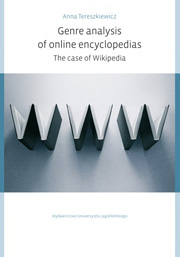5 - Wikipedia as a genre
Published online by Cambridge University Press: 05 September 2014
Summary
Wikipedia – introduction to the project
The analysis of the evolution of genres, as Witosz (2005) emphasizes, should take into account not only the presentation of the newly formed structures, or the discussion of disappearing genres and their relations to new forms, but it should also discover traces of the past or traces of continuation of older genres in those newly emerging. Since Wikipedia evolved from a print antecedent, it is relevant to study the interdependence between its structure and that of a print equivalent in order to observe whether, and if so, to what extent the medium and the technological developments influence the transformation of the genre. In other words, it is important to note to what degree Wikipedia reproduces its print antecedents, and what modifications are introduced into the traditional textual form of an encyclopedia.
Wikipedia constitutes the most appropriate subject for an analysis of the genre of online encyclopedias for a number of reasons. Firstly, while there are a number of other encyclopedias available online, many of which are online versions of print encyclopedias already well established in the market (e.g. Encyclopedia Britannica, MSN Encarta or Columbia Encyclopedia), Wikipedia is the most popular, the most frequently visited and referred to online encyclopedia. This encyclopedia is recognized internationally, having developed equivalents in more than 250 language versions, in contrast to other online encyclopedias.
- Type
- Chapter
- Information
- Genre Analysis of Online EncyclopediasThe Case of Wikipedia, pp. 65 - 98Publisher: Jagiellonian University PressPrint publication year: 2010



